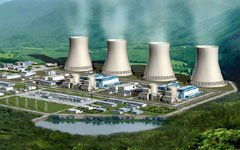China is expected to enact a nuclear security law by 2018 as it builds new nuclear plants while targeting a higher security standard, a senior lawmaker said.
Sun Qin, a member of the Environmental Protection and Resources Conservation Committee of the National People's Congress, told China Daily that a first draft of the law is expected to be released this year.
"The draft will go through the second and third readings in the coming years. We plan to enact it within this term of the NPC," Sun said. The top legislature's current term ends in 2018.
|
 |
|
 |
In China, the incident ended a long debate over whether to introduce third-generation nuclear technology, after the State Council in October 2012 approved the nuclear security plan and medium to long-term nuclear development plan, both of which end in 2020.
The two plans state new nuclear reactors in China must adopt the highest global standard - that is, third-generation technology. The government also imposed a moratorium on the approval of inland nuclear reactor projects.
Third-generation nuclear technology offers what the World Nuclear Association terms "passive safety features" that require no active controls or intervention to avoid accidents in the event of malfunctions. These features "may rely on gravity, natural convection or resistance to high temperatures", according to the WNA.
Most reactors now in use around the world rely on active safety features, which require specific action by operators.
But as severe air pollution has sparked a public outcry and posed a challenge to authority, calls for clean energy have reignited. Nuclear energy is often included in this category because it does not produce emissions.
Premier Li Keqiang said in this year's Government Work Report that China will start construction of some nuclear projects this year.
